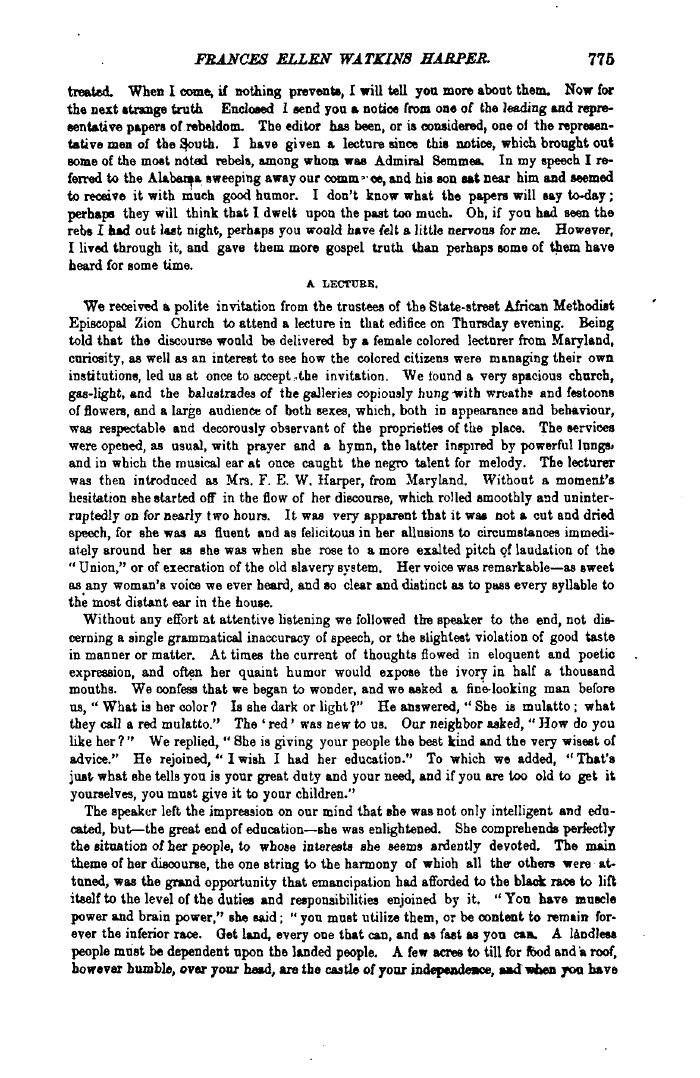 |
||||
 |
||||
| FRANCES ELLEN WATKIN8 HARPER. 77'5 treated. When I come, if nothing prevent*, I will tell you more abont them. Now for the next •tnmge truth Enclosed 1 send you a notice from oa« of the leading and representative papers of rebeldom. The editor has been, or is considered, one of the representative men of the Smooth. I have given a. lecture since this notice, which brought oat some of the most ndted rebels, among whom was Admiral Semmea. la my speech I referred to the Alabama, sweeping away our comm^oe, and bia son sat near him and seemed to receive it with much good humor. I don't know what the papers will Bay to-day; perhaps they will think that I dwelt upon the past too much. Oh, if you bad seen the rebs I tad out iaat night, perhaps you would h»ve felt a little nervous for me. However, I lived through it, and gave tbem more gospel truth than perhaps some of them have beard for gome time. A LECTURE. We received a polite invitation from the trustees of the State-street African Methodist Episcopal Zion Church to attend a lecture in that edi6ce on Thursday evening. Being told that the discourse would be delivered by a female colored lecturer from Maryland, curiosity, aa well as an interest to see how the colored citizens were managing their own institutions, led us at once to accept-the invitation. We tound a very spacious church, gas-light, and the balustrades of tbe galleries copiously hung-with wreath; and festoons of flowers, and & large audience of both sexes, which, both in appearance and behaviour, was respectable and decorously observant of the proprieties of the place. The services were opened, as usual, with prayer and a hymn, the latter inspired by powerful Icngsi and in which the musical ear at once caught the negro talent for melody. The lecturer was then introduced as Mrs. F. E. W. Harper, from Maryland. Without a moment's hesitation she started off in the flow of her diecouree, which rolled smoothly aad uninterruptedly on for nearly two hours. It was very apparent that it wa« not a cut and dried speech, for she was as fluent and as felicitous in her allusions to circumstances immediately around her aa she was when she rose to a more exalted pitch of laudation of the " Union," or of execration of the old slavery system. Her voice was remarkable—as sweet as any woman's voice we ever heard, and so clear and distinct as to pass every syllable to the moat distant ear in the bouse. Without any effort at attentive listening we followed tire speaker to the end, not discerning a single grammatical inaccuracy of speech, or tbe slightest violation of good taste in manner or matter. At times the current of thoughts Sowed in eloquent and poetic expression, and often her quaint humor would expose the ivory in half a thousand months. We confess that we began to wonder, and we asked a fine-looking man before us, " What is her color? Is she dark or light?" He answered, " She is mulatto; what they call a red mulatto." The ' red' was new to us. Oar neighbor asked, " How do you like her ? " We replied, " She is giving your people the best kind and the very wisest of advice." He rejoined," I wish I had her education." To which we added, " That's jmt what she tells you is your great duty and your need, and if you are too old to get it yourselves, you must give it to your children." The speaker left the impression on our mind that she was Dot only intelligent and educated, but—the great end of education—she was enlightened. She comprehends perfectly the situation of her people, to whose interests she seems ardently devoted. The main theme of her discourse, tbe one string to the harmony of which all the- others were attuned, was the grand opportunity that emancipation bad afforded to tbe blade race to lift itself to the level of the duties and responsibilities enjoined by it. " Yon have muscle power and brain power," she said; " yon must utilize them, or be content to remain forever the inferior race. Get land, every one tbat can, and as fast as yon cm. A l&odles* people must be dependent upon the landed people. A few acres to till for food and a roof, however bumble, over your head, are tbe castle of 7001 wdependemce, Md wben you have |